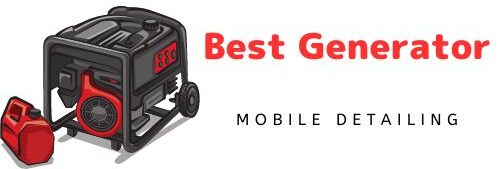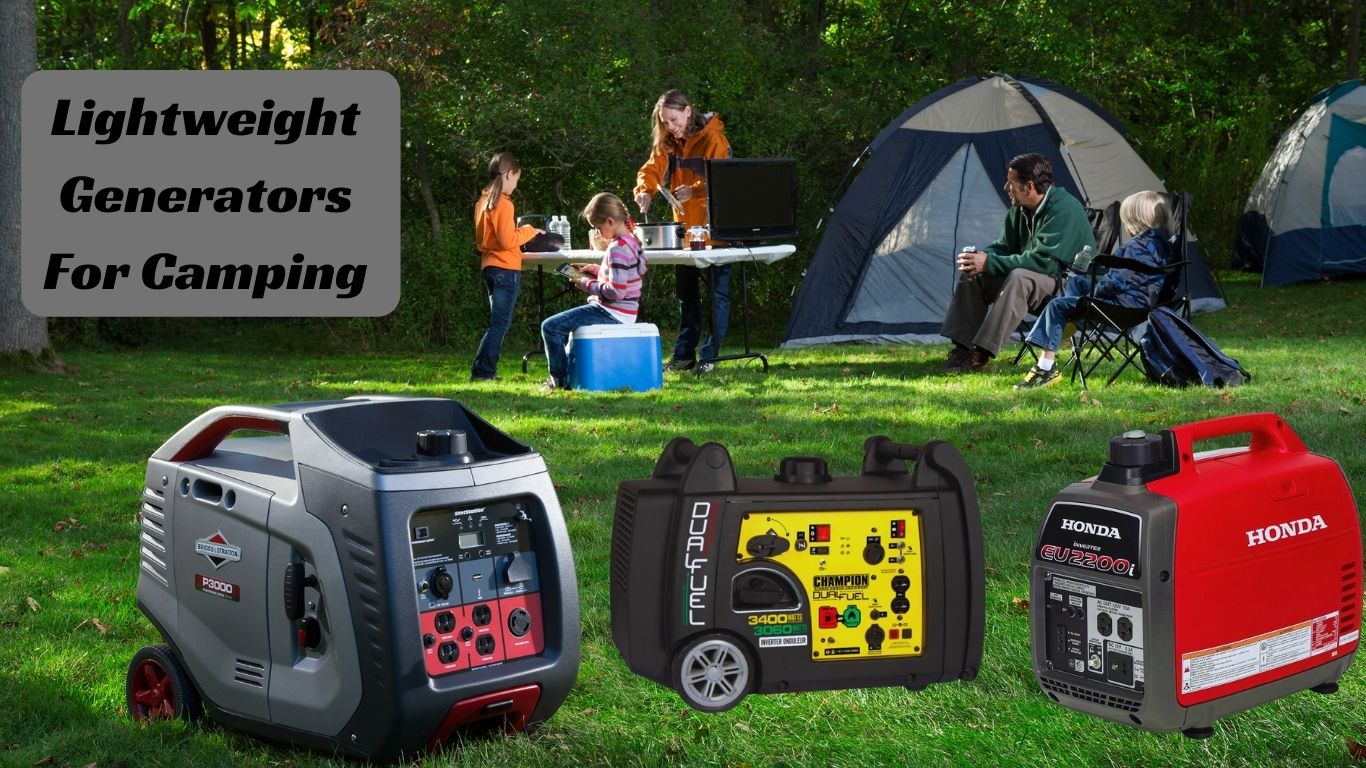Lightweight generators have revolutionized the camping experience by providing a reliable, portable power source without the need for a bulky traditional generator. Designed to be easy to transport and use, these compact units ensure campers can enjoy modern conveniences while exploring the great outdoors. In this guide, “Best Generator for Mobile Detailing,” we will suggest the top 5 Lightweight Generators For Camping to help you have the best camping trips.
What is a Lightweight Generator for Camping?
Definition and Importance of Lightweight Generator
A lightweight generator is a portable power device designed for campers. It provides essential electricity without the bulk and weight of traditional generators. These generators are compact, making them easy to transport and store. They are designed to deliver enough power to charge devices, run small appliances, and keep lights on, ensuring a comfortable camping experience.
For campers, a lightweight generator is crucial. It allows you to stay connected, maintain safety with adequate lighting, and enjoy modern conveniences while exploring the outdoors. With a reliable power source, you can extend your trips without worrying about running out of power. It enhances the overall camping experience, making it more enjoyable and less stressful.
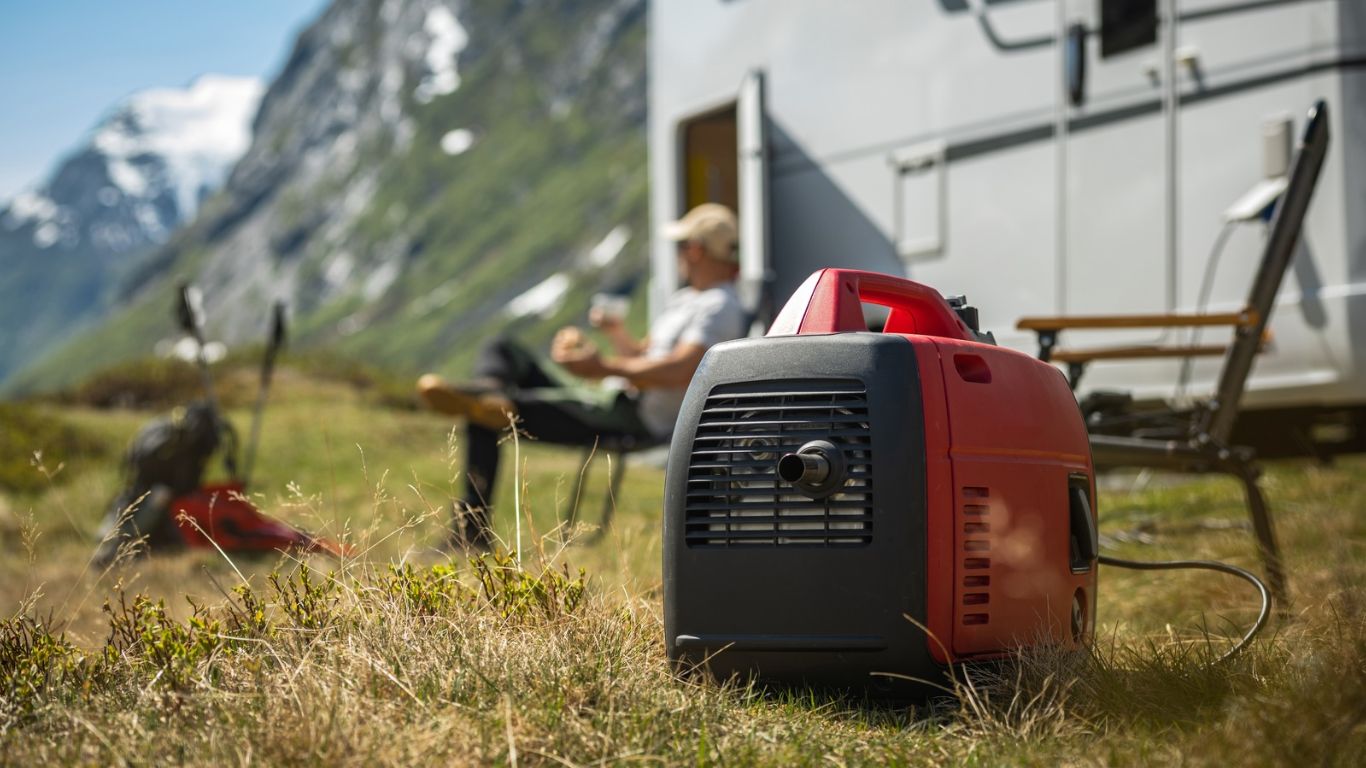
Benefits of Using a Lightweight Generator for Camping
Using a lightweight generator offers numerous advantages. Its portability is a key benefit, as it can be easily carried to remote locations. This convenience ensures that you have power wherever you go.
A lightweight generator is also a dependable power source. It can run for hours, providing consistent electricity for your needs. Whether charging your phone, running a mini-fridge or powering a fan, it ensures you have the energy you need.
Moreover, these generators are versatile. They can be used in various situations, from camping trips to outdoor events. Their compact size and efficient design make them a practical choice for anyone needing portable power.
A lightweight generator for camping is an invaluable tool. It provides the power you need, when you need it, ensuring your outdoor adventures are comfortable and enjoyable.
Essential Features for Selecting the Best Lightweight Camping Generator
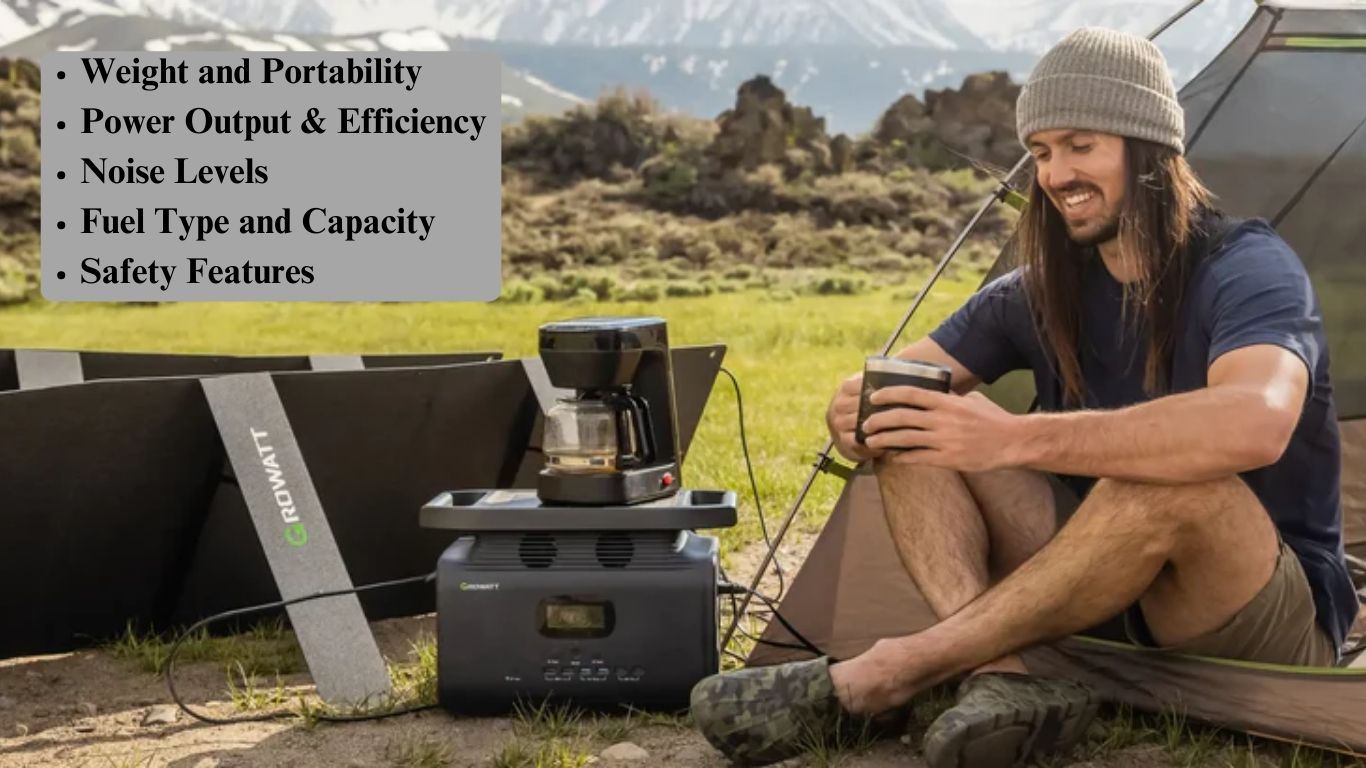
Weight and Portability
When selecting a lightweight camping generator, weight and portability are crucial. A lightweight design ensures that the generator is easy to carry and move around. This is vital for campers who need to transport their equipment over various terrains. A compact generator can be stored easily in your vehicle or campsite, freeing up space for other essentials.
Ease of transport and storage cannot be overlooked. A generator that is light and portable allows you to focus on enjoying your camping experience without the hassle of managing bulky equipment. Look for models with built-in handles or wheels, making it simple to move the generator wherever needed. The goal is to find a balance between weight and power, ensuring the generator is manageable without sacrificing performance.
Power Output and Efficiency
Power output and efficiency are key considerations. Your generator should provide enough power to run your camping equipment, from lights to small appliances. Consider the wattage requirements of your devices and choose a generator that can meet these needs. A generator with multiple outlets is ideal, allowing you to power several devices simultaneously.
Efficiency is equally important. A fuel-efficient generator will run longer on a single tank, reducing the need for frequent refueling. Look for generators with eco-mode features, which adjust the engine speed based on the power demand. This not only saves fuel but also extends the generator’s runtime, making it more reliable during extended camping trips.
Noise Levels
Noise levels are a significant factor in a camping environment. A quiet generator ensures that you can enjoy the peace and tranquility of nature without the constant hum of machinery. Look for models that are designed for quiet operation, often indicated by a decibel rating. Generators with noise levels below 60 decibels are ideal, as they produce sound comparable to a normal conversation.
Comparing noise levels across different models can help you find the quietest option. Inverter generators are often quieter than traditional ones, making them a popular choice among campers. A quiet generator enhances the camping experience, allowing you to relax and enjoy the surroundings without disturbance.
Fuel Type and Capacity
The type of fuel used in a generator affects its performance and convenience. Common fuel types include gasoline, propane, and dual-fuel options. Gasoline generators are widely available and easy to refuel, while propane generators offer cleaner burning and longer shelf life. Dual-fuel generators provide flexibility, allowing you to switch between fuel types based on availability and preference.
Fuel capacity impacts the generator’s runtime. A larger fuel tank means the generator can run longer without needing a refill. Consider the duration of your camping trips and choose a generator with a suitable fuel capacity. Efficient fuel usage and ample capacity ensure that you have a consistent power supply throughout your trip.
Safety Features
Safety features are essential for any generator. Overload protection prevents the generator from being damaged by excessive power demands. Low-oil shutoff protects the engine by automatically shutting down the generator when oil levels are too low. Safety certifications indicate that the generator meets industry standards for safe operation.
Choosing a generator with these safety features gives you peace of mind. It ensures that the generator operates safely and reliably, reducing the risk of accidents or damage. A generator with robust safety features is a wise investment, providing a dependable power source while keeping you and your equipment safe.
Selecting the best lightweight camping generator involves considering weight and portability, power output and efficiency, noise levels, fuel type and capacity, and safety features. These factors ensure that you have a reliable, convenient, and safe power source for your outdoor adventures.
Top 5 Lightweight Generators for Camping
Best Overall: Honda EU2200i
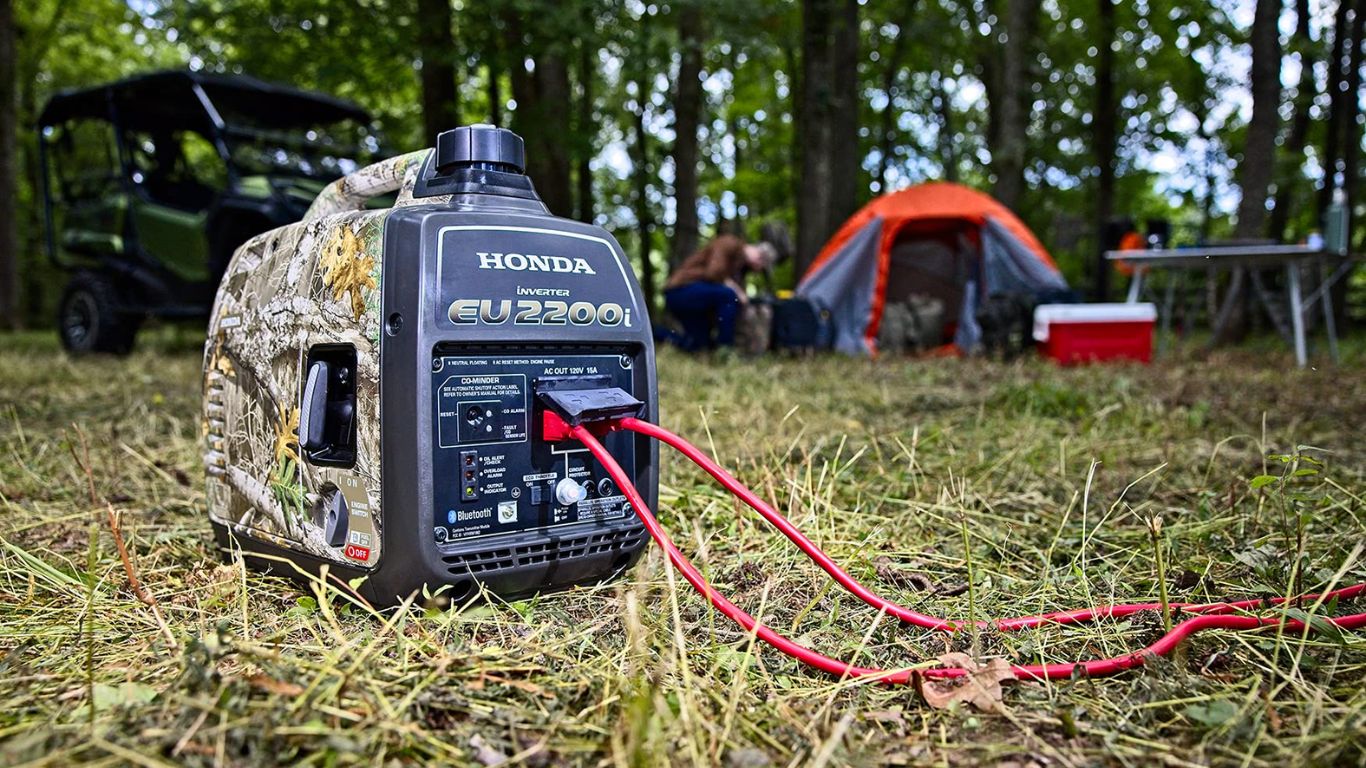
The Honda EU2200i is a top performer in the lightweight generator category. Weighing just under 47 pounds, it is designed for easy transport and storage, making it ideal for camping. This generator produces 2,200 watts of power, enough to run most camping equipment like lights, fans, and small appliances. Its inverter technology ensures clean, stable power, which is crucial for sensitive electronics like phones and laptops.
| Product Features | Pros | Cons |
|---|---|---|
|
|
|
Customer Reviews: Customers consistently praise the Honda EU2200i for its reliability and quiet operation. Many users highlight its ease of use and long runtime, making it a favorite for extended camping trips.
Best for Budget: Westinghouse iGen1200
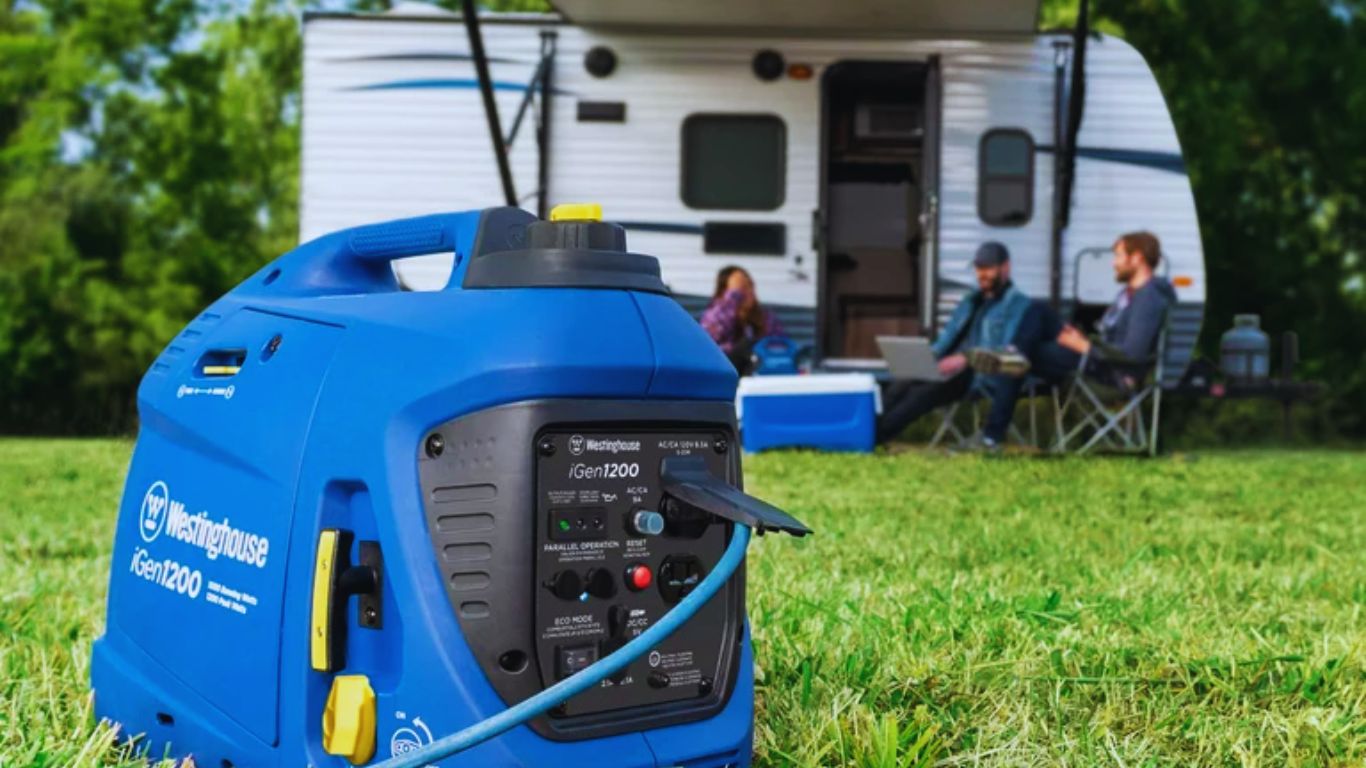
The Westinghouse iGen1200 offers excellent value for money. At 33 pounds, it is one of the lightest generators available, making it perfect for campers who prioritize portability. It provides 1,200 watts of power, which is sufficient for basic camping needs like charging devices and running small appliances. The generator is also very fuel-efficient, offering up to nine hours of runtime on a 0.8-gallon tank.
| Product Features | Pros | Cons |
|---|---|---|
|
|
|
Customer Reviews: Users appreciate the Westinghouse iGen1200 for its affordability and efficiency. Many reviews mention its lightweight design and ease of use, making it a popular choice for budget-conscious campers.
Best for Quiet Operation: Yamaha EF2000iSv2
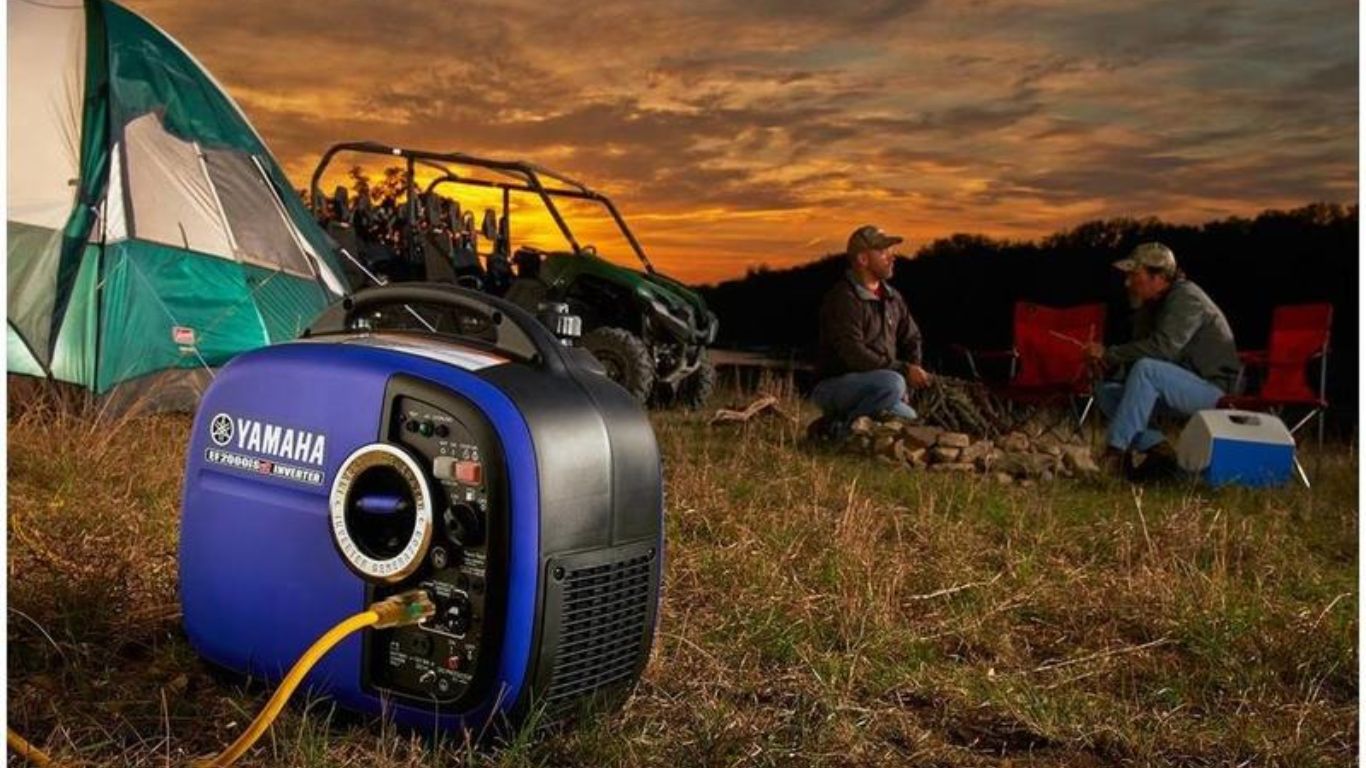
The Yamaha EF2000iSv2 is renowned for its quiet operation, a crucial feature for maintaining a peaceful camping environment. Weighing 44 pounds, it is portable and easy to handle. This generator delivers 2,000 watts of power, sufficient for various camping applications. Its noise level ranges from 51.5 to 61 dBA, making it one of the quietest generators in its class.
| Product Features | Pros | Cons |
|---|---|---|
|
|
|
Customer Reviews: Customers often highlight the Yamaha EF2000iSv2’s quietness and reliability. Many reviews emphasize its efficient fuel consumption and ease of use, making it a preferred choice for noise-sensitive campers.
Best for Fuel Efficiency: WEN 56200i
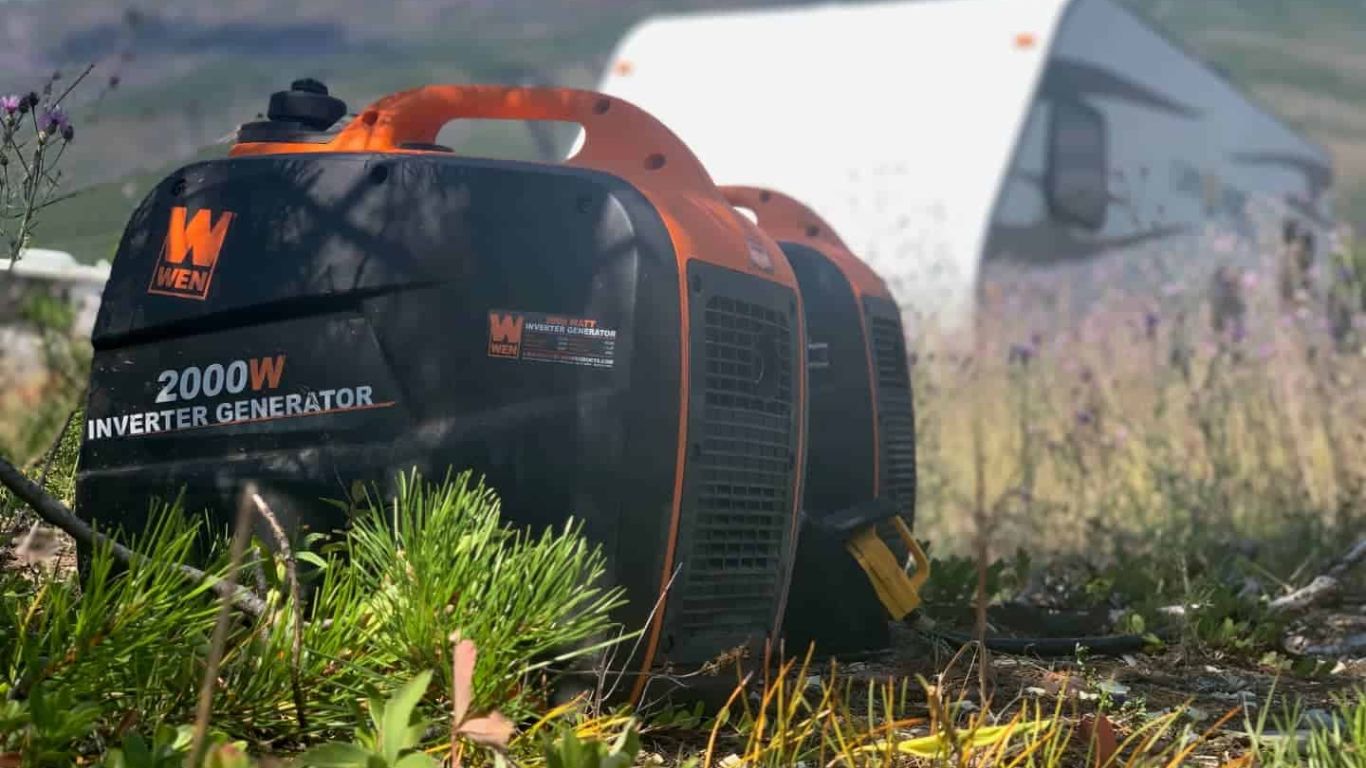
The WEN 56200i is known for its exceptional fuel efficiency. Weighing 48 pounds, it is slightly heavier but still portable. This generator provides 2,000 watts of clean power and is safe for sensitive electronics. Its eco-mode feature automatically adjusts fuel consumption based on the power demand, providing up to six hours of runtime on a 1-gallon tank.
| Product Features | Pros | Cons |
|---|---|---|
|
|
|
Customer Reviews: Users frequently mention the WEN 56200i’s fuel efficiency and quiet operation. Many reviews praise its ease of use and reliable performance, making it a great option for longer camping trips.
Best for High Power: Champion 3400-Watt Dual Fuel
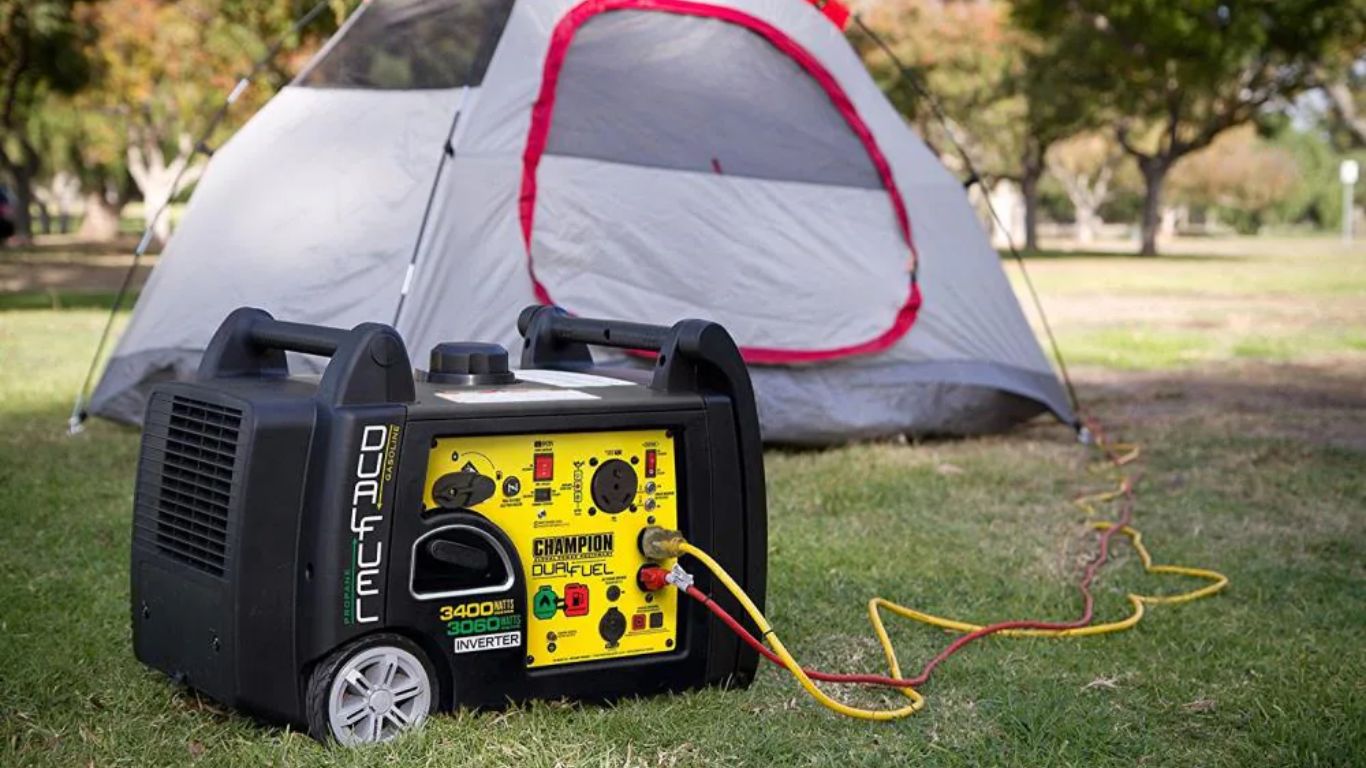
The Champion 3400-watt dual-fuel generator offers high power and versatility. Weighing 95 pounds, it is heavier but manageable with built-in wheels and handles. This generator provides 3,400 watts of power, making it suitable for heavy-duty camping equipment. Its dual-fuel capability allows it to run on either gasoline or propane, offering flexibility based on fuel availability.
| Product Features | Pros | Cons |
|---|---|---|
|
|
|
Customer Reviews: Customers appreciate the Champion 3400-watt dual-fuel generator for its power and versatility. Reviews often highlight its dual-fuel capability and high power output, making it a top choice for those needing more energy.
Choosing the right lightweight generator depends on your specific needs. The Honda EU2200i offers reliability, the Westinghouse iGen1200 is budget-friendly, the Yamaha EF2000iSv2 is ultra-quiet, the WEN 56200i is fuel-efficient, and the Champion 3400-Watt Dual Fuel provides high power. Each of these generators has unique features that cater to different camping requirements.
How to Use a Lightweight Generator Safely for Camping
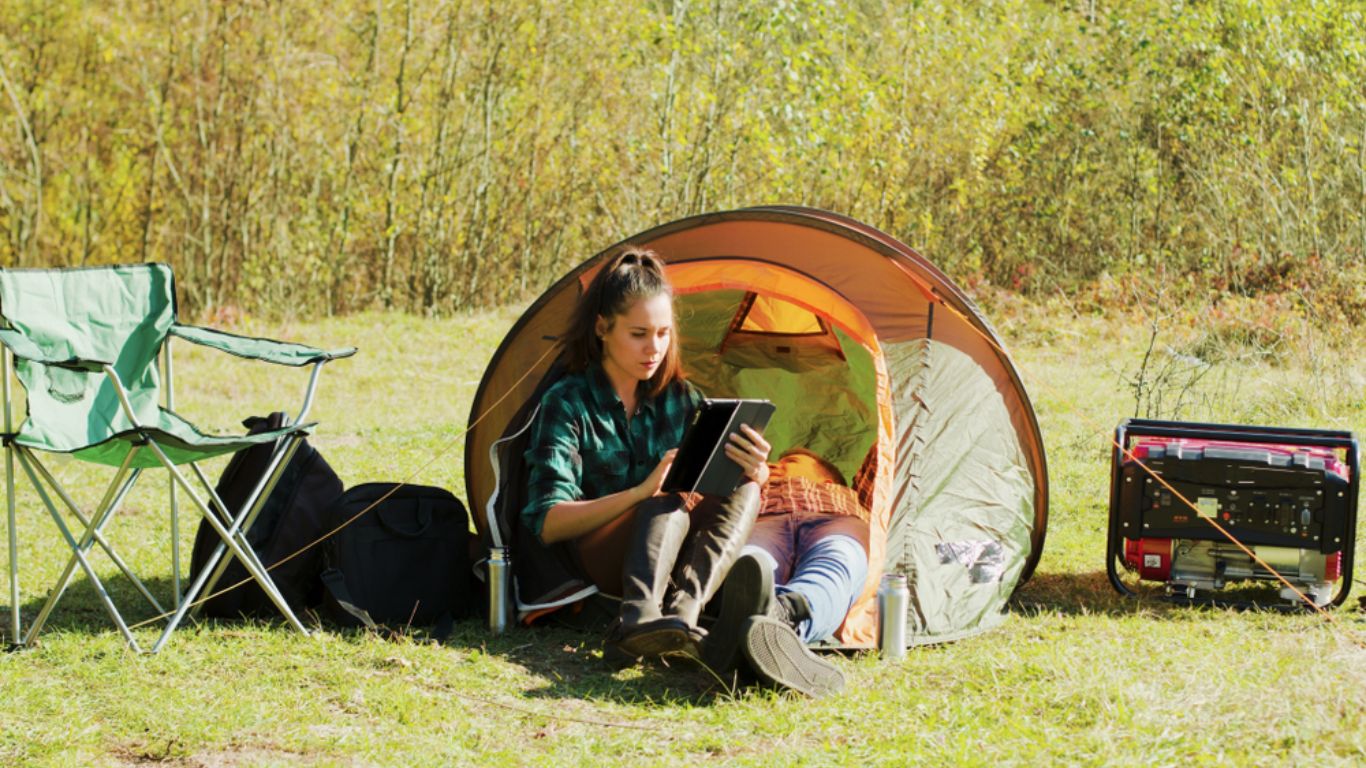
Read the Manual
Before using your generator, read the manual. It contains essential information about operating the generator safely. Each model has specific instructions and guidelines. Following these instructions helps prevent accidents and ensures efficient use.
Choose the Right Location
Place the generator on a flat, stable surface away from your tent and other camping gear. Generators produce carbon monoxide, a harmful gas. Ensure it is at least 20 feet away from any sleeping area and downwind to avoid exhaust fumes. Never use a generator indoors or in enclosed spaces.
Check Fuel and Oil Levels
Before starting the generator, check the fuel and oil levels. Use the correct fuel type specified in the manual. Overfilling can cause leaks and spills while underfilling can damage the engine. Regularly check the oil level and top it up as needed.
Start the Generator Safely
Turn off all connected devices before starting the generator. This prevents sudden power surges that can damage your equipment. Follow the start-up procedure in the manual. Usually, this involves turning on the fuel valve, setting the choke, and pulling the starter cord or pressing the start button.
Use Extension Cords Safely
Heavy-duty extension cords are rated for outdoor use. Ensure the cords are in good condition without cuts or frays. Connect the cords to the generator’s outlets securely. Keep cords off the ground to prevent tripping and avoid running them through water.
Monitor the Load
Do not overload the generator. Check the wattage of your devices and ensure the total does not exceed the generator’s capacity. Overloading can cause the generator to overheat or shut down. Use only essential devices to keep the load within safe limits.
Refuel with Care
Turn off the generator and let it cool before refueling. Refueling a hot generator can cause fuel to ignite. Use a funnel to pour fuel to avoid spills. Clean up any spills immediately. Store fuel in approved containers away from the generator and campfire.
Perform Regular Maintenance
Regular maintenance keeps your generator running efficiently and safely. Follow the maintenance schedule in the manual. This includes changing the oil, cleaning the air filter, and checking the spark plug. Regular checks can prevent unexpected breakdowns and extend the generator’s lifespan.
Store the Generator Properly
When not in use, store the generator in a dry, cool place. Drain the fuel tank and run the generator until it stops to prevent fuel from going stale. Clean the generator and cover it to protect it from dust and debris.
Using a lightweight generator safely for camping involves careful planning and adherence to safety guidelines. By following these steps, you can enjoy the benefits of portable power while ensuring your safety and that of others. Stay calm, follow the rules, and make the most of your outdoor adventures.
Conclusion
Choosing the right lightweight generator for camping involves considering factors like weight, power output, noise levels, fuel efficiency, and safety features. Whether you prioritize portability, budget, quiet operation, fuel efficiency, or high power, there is a generator to meet your needs. By following safety guidelines and proper usage practices, you can maximize the benefits of your generator, ensuring a comfortable and enjoyable camping experience. Embrace the convenience and reliability of portable power to make the most of your outdoor adventures.
Marion Woods is an accomplished generator technology expert with over 15 years of experience, currently serving as the Chief Technology Officer at GenTech Power Solutions. She holds a Master’s degree from MIT and specializes in enhancing generator efficiency and integrating renewable energy sources. Marion is a respected author and speaker in the engineering community, dedicated to pioneering sustainable power solutions.
